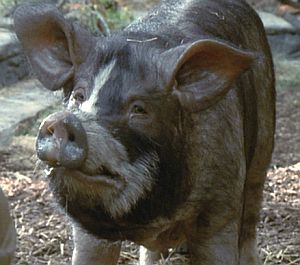
70 years ago, more or less, Eric Blair, better known as George Orwell, found a publisher for his instant and perennial classic: Animal Farm. It had been rejected by T. S. Eliot for Faber & Faber (“after all, your pigs are far more intelligent than the other animals, and therefore are the best qualified to run the farm—in fact there couldn’t have been an Animal Farm without them”), and by another editor for Jonathan Cape (“I think the choice of pigs as the ruling caste will no doubt give offence to many people, and particularly to anyone who is a bit touchy, as undoubtedly the Russians are”). But it would be published at last, in England, in August of 1945, just 8 days after the second and last atomic bomb was dropped.
The story is as simple as a story can be. One fine midsummer evening Mr Jones the farmer is overthrown, and the animals take over his farm.
But before long, the person is replaced by a pig. Napoleon, the big Berkshire boar, starts to appropriate milk and apples (“day and night we are watching over your welfare”); he takes up a with bodyguard (“nine enormous dogs wearing brass-studded collars”); he moves into the farmhouse (“more suited to the dignity of the Leader”); and he orders dissenters slaughtered (“the tale of confessions and executions went on, until there was a pile of corpses lying before Napoleon’s feet”). He’s honored with exalted titles like Father of All Animals; and he makes himself personally responsible for the prolificity of all pigs. I'd forgotten that Orwell was responsible for these words:
“There were many more mouths to feed now. In the autumn the four sows had all littered about simultaneously, producing thirty-one young pigs between them. The young pigs were piebald, and as Napoleon was the only boar on the farm, it was possible to guess at their parentage.”
This sad little story, like other mid-20th-century dystopian allegories, is of course steeped in history—and in natural history. Overthrown farmer Jones is a stand-in for Tsar Nicholas II, and his usurper Napoleon the boar is a stand-in for Stalin—the Man of Steel, Iosif Vissarionovich Dzhugashvili, General Secretary of the Communist Party, Premier of the Soviet Union and Father of Nations. Evidence collected over the last decades suggests that his government was directly or indirectly responsible for millions of deaths. There were deportations, there was famine, there was hard labor in gulags, there were political executions.
Other evidence suggests that Stalin's secret policeman, Lavrentiy Beria, was driven around Moscow in an armored limousine, from which he solicited young women. As the girls left his palaces or dachas, Beria's bodyguards would hand them flowers: to accept made the visit consensual; to refuse meant arrest. “Now it’s not a bouquet, it’s a wreath! May it rot on your grave!”
All of which would have reminded George Orwell of wild boars. Sus scrofa in Russia generally live in small groups, or "sounders," made up of sucklings and sows. Before the breeding season, in late fall, roughly 5 to 8 females live together with roughly 15 to 20 of their young; then the males come along. As the rut commences, their glands secrete a viscous, foamy, yellowish liquid, often sprayed; and their testes double in size. Females in heat are pursued. Competitors for those females are mauled.
SOUND TRACK:


